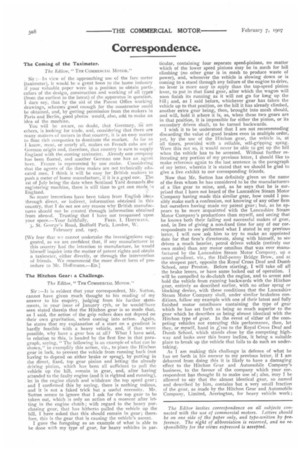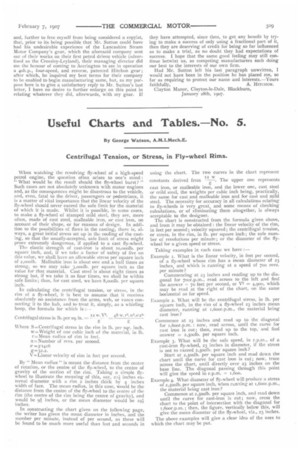Correspondence.
Page 18

Page 19

If you've noticed an error in this article please click here to report it so we can fix it.
The Coming of the Taximeter.
The Editor," TIM COMMERCIAL MOTOR."
Sir :In view of the approaching use of the fare meter (taximeter), it would be a great boon to the home industry if your valuable paper were in a position to obtain particulars of the design, construction and working of all types (from the earliest to the latest) of the apparatus in question. I dare say, that by the aid of the Patent Office working drawings, schemes good enough for the constructor could be obtained, and, by getting permission from the makers in Paris and Berlin, good photos would, also, add to make an idea of the machine.
You will be aware, no doubt, that Germany, as are others, is looking for trade, and, considering that there are many makers of meters in. that country, it is an easy matter to float rich companies to dominate the market. As far as -I know, most, or nearly all, makes on French cabs are of German origin and, therefore, that country is sure to supply England with the .coming taximeter. Already one company has been floated, and another German one has an agent here. France is represented by one make. Considering that the agents of the three makes are not technically educated men, I think it will be easy for British makers to push a meter of home manufacture, if it is a gopd one. The 1st of July being the date when Scotland Yard demands the registering machine, there is still time to get one made ;t1
England. • So many inventions have been taken from English ideas through direct, or indirect, information obtained in this 'country, that I do not see any reason why British manufactures should not be created through information obtained from abroad. Trusting that I have not trespassed upon your space.—Your faithfully, FRED. I. HOFFMANN. 3, St. George's Road, Bedfoid Park, London, NV. February and, 1oo7.
(We fear that we cannot undertake the investigations suggested, as we are confident that, if any manufacturer in this country had the intention to manufacture, he would himself inquire into the matter of patent rights and obtain a taximeter, either directly, or through the intervention of friends. We recommend the more direct form of procedure to Mr. IToffmann.—ED.1 The Hitchon Gear: a Challenge.
The Editor," THE COMMERCIAL MOTOR."
Sir :—It is evident that your correspondent, Mr. Sutton, cannot have given much thought to his reading of my answer to his enquiry, judging from his further statements, in your issue of January 17th, or he would ,have seen stated therein that the Hitchon gear is so made that, as I said, the action of the grip rollers does not depend on their own gravitation, when coming into action. Again, he states that my explanation of a start on a gradient is hardly feasible with a heavy vehicle, and, if that were possible, why have a gear box at all? What I have said, in relation to this, is headed by the first line in that paragraph, saying, " The following is an example of what can be shown," to exemplify this action, viz., to place the Hitchon gear in lock, to prevent the vehicle from running back (not having to depend on either brake or sprag), by putting in the direct, fixed, top gear pinion and letting the already driving pinion, which has been all sufficient to pull the vehicle up the hill, remain in gear, and, after having attended to the faulty engine (and it is righted and running), let in the engine clutch and withdraw the top speed gear ; and I confirmed this by saying, there is nothing tedious, and it is not a faked trick but a useful necessity. Mr. Sutton seems to ignore that I ask for the top gear to be taken out, which is only an action of a moment after let. ting in the engine clutch ; with regard to the heavy purchasing gear, that has hitherto pulled the vehicle up the hill, I have asked that this should remain in gear; therefore, this is the gear that is causing the vehicle's ascent. I gave the foregoing as an example of what is able to be done with my type of gear, for heavy vehicles in par
ticular, containing four separate speed-pinions, no matter which of the lower speed pinions may be in mesh for hill climbing (no other gear is in mesh to produce waste of power), and, whenever the vehicle is slowing down or is coming to a stand through any failure of the engine to drive, no lever is more easy to apply than the top-speed pinion lever, to put in that fixed gear, after which the wagon will soon finish its running as it will not go for long up the ; and, as I said before, whichever gear has taken the vehicle up to that position, on the hill it has already climbed, another extra gear being, then, brought into mesh should, and will, hold it where it is, as, when these two gears are in that position, it is impossible for either the pinion, or its secondary driven shaft, to be turned backwards.
I wish it to be understood that I am not recommending discarding the value of good brakes even in multiple order, yet, by the use of the Hitchon gear, the vehicle is, at all times, provided with a reliable, self-gripping sprag. Were this not so, it would never be able to get up the hill when the vehicle has to be arrested, Without further reiterating any portion of my previous letter, I should like to make reference again to the last sentence in the paragraph of my letter, wherein it is stated that we should be glad to give a live exhibit to our corresponding friends.
Now that Mr. Sutton has definitely given us the name of the firm whom he has considered to be the manufacturers of a like gear to mine, and, as he says that he is surprised that I have not heard of the Lancashire Steam Motor Company having made this similar gear, how could I possibly make such a confession, not knowing of any other firm but ourselves having made my patent gear ; but, as he appears to be more acquainted with the Lancashire Steam Motor Company's productions than myself, and seeing that he knows both their failing and successful makes of gear, and, in lieu of giving a non-fixed time for any of our correspondents to see performed what I stated in my previous letter, I will now ask him to try to make an appointed date for that firm's directorate, along with himself, to see driven a much heavier, petrol driven vehicle (entirely our own make) than any motor omnibus that was ever manufactured by the Lancashire Steam Motor Company, up a noted gradient, viz., the Half-penny Bridge Brow, and at the steepest part, opposite the Royal Cross Deaf and Dumb School, near Preston. Before starting, I will take off all the brake levers, or have same locked out of operation. I will be compelled to de-clutch the engine, and to arrest and hold the vehicle from running backwards with the Hitchon gear, entirely as described earlier, with no other sprag or blocking device, with these conditions that the Lancashire Steam Motor Company shall, under similar brakeless conditions, follow my example with one of their latest and fully finished motor omnibuses containing the type of gear which he has set forth as being so much superior to the gear which he describes as being almost identical with the Hitchon type of gear. In the event of either of the competing vehicles not executing this performance, then, let they, or myself, hand in L:too to the Royal Cross Deaf and Dumb School, which stands close by the competing highway and looks over this heavy incline, it being a suitable place to break up the vehicle that fails to do such an undertaking.
As I am making this challenge in defence of what he has set forth in his answer to my previous letter, if I am debarred from doing this it is likely to have a damaging effect to the Hitchon Gear and Automobile Company's business, to the favour of the company which your correspondent has thought fit to make use of ; also, may I be allowed to say that the almost identical gear, so named and described by him, contains but a very small fraction of the gear, as made by the Hitchon Gear and Automobile Company, Limited, Accrington, for heavy vehicle work; and, further to free myself from being considered a copyist, that, prior to its being possible that Mr. Sutton could have had his undesirable experience of the Lancashire Steam Motor Company's gear, which the aforesaid company sent out of their works on their first petrol driven vehicle (advertised as the Crossley-Leyland), their managing director did inc the hcnour of coming to Accrington to see in operation a 4oli.p.i four-speed, and reverse, patented Hitchon gear; after which, he inquired my best terms for their company to be enabled to begin manufacturing same, but, as my purpose here is to give a satisfactory reply to Mr. Sutton's last letter, I have no desire to further enlarge on this point in relating whatever they did, afterwards, with my gear. If
they have attempted, since then, to get any benefit by trying to make a success of only using a fractional part of it, then they are deserving of credit for being so far influenced as to make a trial, as no doubt they had expectations of success. I hope that the same good feeling may still continue betwixt us, as competing manufacturers each doing our best to the interests of our own firm.
Had Mr. Sutton left his last paragraph unwritten, I would not have been in the position he has placed me, so far as requiring to protect our name and interests.—Yours faithfully, A. HITCHON. Clayton Manor, Clayton-le-Dale, Blackburn, January 28th, 1907.






















